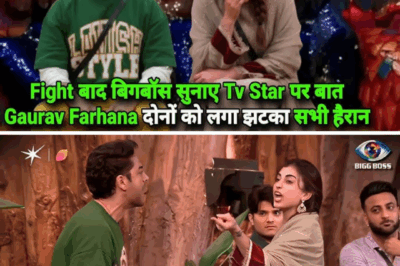The Bigg Boss 19 house, usually a whirlwind of laughter, playful banter, and strategic alliances, was anything but calm on the morning of Episode 74. The air felt thick, almost palpable, with tension, as if the house itself was bracing for an inevitable storm. Contestants moved with caution, exchanging glances that hinted at unspoken words, while viewers at home already sensed that something major was about to unfold. The focus of this storm was unmistakably Mridul Tiwari and Farrhana Bhatt, two housemates whose simmering friction had been quietly building over the past few weeks.
It all began with a seemingly trivial remark. Farrhana, with her usual confident poise, made a passing comment that, on the surface, seemed almost innocuous. But for Mridul, it was the spark that ignited a cascade of pent-up frustration. “Bewakoof,” she had muttered, a word that translates simply to “fool,” but in the context of the house, it carried an unexpected weight. Mridul’s reaction was immediate and sharp. The moment stretched, every second heavy with the possibility of eruption. The camera caught his eyes narrowing, a subtle tremor in his voice as he responded, “What’s an educated person like you doing among us?” It wasn’t just a jab; it was a challenge, a questioning of Farrhana’s intentions and her place in the house’s complex social fabric.
The housemates, usually engrossed in their own games, paused. Conversations halted mid-sentence. The background music, a subtle hum, seemed almost to mimic the tension building between the two. Mridul’s words were calculated, his tone layered with irony and a hint of suppressed emotion. But it wasn’t only about the insult; it was about respect, hierarchy, and recognition within the house. He went on, almost theatrically, “I’ve earned more sitting here than your yearly income, Farrhana ji,” a statement that drew both gasps and murmurs from the surrounding contestants. The audacity of the claim, combined with the personal undertone, transformed a verbal spat into a moment of high drama.
Farrhana, unsurprisingly, didn’t back down. Her expression flickered between amusement and indignation, as though she were weighing each word carefully before letting it fall. For her, this was not just a personal exchange but a test of her standing, a moment to assert that she was not easily intimidated. “You think words like these make you powerful?” she retorted, her voice firm but tinged with disbelief. The confrontation escalated, each remark building on the last, a verbal duel layered with strategy, emotion, and subtle provocations that only long-time viewers could fully appreciate.
What made this episode extraordinary wasn’t just the argument itself but the undercurrent of raw emotion that underlined it. Mridul, who had often been seen as composed, almost detached, began showing cracks in his usual armor. His voice wavered at moments, his eyes glistening with the kind of vulnerability rarely displayed on camera. It was as if the weight of the house, the expectations, and the personal stakes had suddenly converged into this one explosive moment. And for viewers, it was mesmerizing. The Bigg Boss house thrives on conflict, yes, but when it’s this personal, this human, it transcends mere entertainment. It becomes a lens into ambition, insecurity, pride, and the desperate need for acknowledgment.
Meanwhile, the other contestants oscillated between intervention and observation. Some tried to mediate, sensing the escalation might spiral out of control. Others watched, perhaps calculating alliances, or simply indulging in the spectacle unfolding before them. The dynamics of the house are never static, and moments like these are catalysts, altering relationships in ways that ripple for days, sometimes weeks. The camera subtly captured these shifts—furtive glances, whispered asides, subtle shifts in body language—all hinting that alliances might be tested, loyalties questioned, and strategies reconsidered.
As the confrontation reached its peak, there was a moment of eerie silence. Both Mridul and Farrhana paused, catching their breaths, their expressions a complex mix of defiance, frustration, and something more tender—an almost imperceptible trace of fear. Mridul, especially, seemed momentarily overwhelmed. “I feel so weak,” he admitted, almost to himself, a confession that was picked up by the mic, hanging in the room like a fragile thread. It was a glimpse behind the curtain of performance, a fleeting window into the vulnerability that lies beneath the bravado that reality television often demands.
Yet, the drama wasn’t just about emotion. It was also about strategy. Every word, every pause, every glance was part of a subtle game, one that required careful navigation. Farrhana, intelligent and intuitive, seemed aware that conceding ground could have ramifications far beyond this single argument. Mridul, on the other hand, was wrestling with his own sense of fairness, recognition, and the desire to assert his place in the social hierarchy of the house. The collision of these personal and strategic elements made Episode 74 a study in human behavior, raw and unfiltered.
For the viewers, the tension was addictive. Social media buzzed as clips circulated, reactions poured in, and debates flared about who was “right” or “wrong.” The Bigg Boss audience, accustomed to alliances and secret tasks, saw something different here: the unvarnished humanity of two individuals under pressure. The argument became symbolic, a microcosm of the larger dynamics of the house—a place where every action is scrutinized, every word has weight, and where the smallest spark can ignite an emotional wildfire.
And then there was the aftermath. Once the confrontation ended, the house didn’t immediately return to normal. The air remained charged, heavy with unresolved tension. Housemates whispered in corners, trying to process what had happened. The atmosphere was fragile, a delicate balance between curiosity, judgment, and the anticipation of what might unfold in the coming episodes. For Mridul and Farrhana, the exchange would linger, a reference point in conversations and strategies, a reminder of the thin line between personal expression and house politics.
Episode 74, particularly this confrontation, reminded viewers why Bigg Boss continues to captivate audiences. It is not merely about tasks or eliminations; it is about observing human psychology under pressure, witnessing the collision of egos and emotions, and understanding that behind the entertainment lies something deeply relatable. In Mridul’s and Farrhana’s clash, there was frustration, pride, hurt, strategy, and courage all interwoven, creating a tapestry of drama that was as compelling as it was unpredictable.
As the episode drew to a close, viewers were left with lingering questions. Who would truly emerge stronger from this confrontation? How would the other housemates align themselves in the aftermath? And what would this mean for the trajectory of both Mridul and Farrhana in the remaining weeks of Bigg Boss 19? The answers, naturally, would unfold slowly, keeping audiences hooked, their curiosity piqued, as only Bigg Boss can.
Episode 74 had done more than just entertain; it had given the audience a reason to care, to speculate, and to feel invested in the lives of the contestants. The clash between Mridul and Farrhana was not just a fight; it was a revelation of character, a test of resilience, and a reminder that even in a controlled environment like the Bigg Boss house, emotions are never truly contained. It was raw, it was real, and it left viewers on the edge of their seats, hungry for what would come next.
As the dust settled from the heated confrontation between Mridul and Farrhana, the Bigg Boss house did not return to its usual rhythm. The argument had left ripples, subtle yet unmistakable, across every corner of the home. Housemates who had been quietly observing were now forced to process the fallout. Alliances that had seemed stable were suddenly tested, and friendships that appeared unshakeable now carried a shadow of doubt. Every glance exchanged in the living area, every whisper in the kitchen, held the weight of the recent clash.
Kunickaa, who had been closely watching the argument, felt an uneasy mix of amusement and concern. She had long navigated the house with caution, balancing friendships and strategic positioning. Mridul’s outburst was a reminder that even the most composed contestants could be unmasked under pressure. She whispered to Ashnoor about the incident, highlighting the sharpness of Mridul’s remarks and the intensity of Farrhana’s retaliation. Their conversation reflected more than gossip; it was a micro-analysis of power dynamics, showing how every word and action in the house had potential repercussions.
Abhishek, meanwhile, stayed unusually quiet. Often seen as a mediator in past conflicts, he now chose observation over intervention. There was a method in his silence—each housemate’s reaction was data, each emotion a clue. The strategic mind of Abhishek interpreted the confrontation not just as a personal conflict but as an opportunity to reassess alliances and potential threats. Who was gaining influence? Who was losing credibility? And who might be swayed to shift loyalties in the days ahead?
The tension wasn’t confined to the immediate area of the confrontation. Even in the more relaxed corners of the house, conversations carried undertones of the argument. Some housemates discussed Mridul’s outburst with admiration, interpreting it as a bold stand, while others saw it as reckless, a misstep that could jeopardize his position. Farrhana, for her part, received a mix of sympathy and scrutiny. Some housemates privately acknowledged her composure under attack, while others questioned whether her sharp response would isolate her from potential allies.
Meanwhile, Bigg Boss orchestrated subtle tasks and prompts that heightened the tension further. Every challenge, every chore, now felt layered with meaning. A simple exchange of words during a group activity could reignite unresolved conflict. In the bathroom, in the garden, and even during routine meal preparations, small sparks flared. Housemates who had been careful to avoid confrontation found themselves drawn into debates or forced to take sides. The emotional energy of the house had shifted, and everyone was keenly aware that the balance of power could change in an instant.
One of the most dramatic aspects of the aftermath was Mridul’s introspection. Behind closed doors, he expressed a mixture of pride and frustration. “I can’t let anyone undermine me,” he confided to the diary room camera, his voice tense yet revealing vulnerability. “But at the same time, I don’t want this to define me in the house. I feel like I’m walking a tightrope—one wrong step, and everything could collapse.” These words were not just a reflection of ego; they revealed a deep awareness of the psychological game at play. Every argument, every confrontation, was both personal and strategic, intertwined in ways that were difficult to untangle.
Farrhana, on the other hand, focused on recalibrating her position. She knew that the confrontation, while necessary to assert her presence, had consequences. In conversations with other housemates, she carefully balanced defiance with diplomacy. Her approach was subtle: maintain strength without appearing overbearing, assert opinion without alienating potential allies. The house, a microcosm of society, demanded this kind of tactical navigation. For viewers, watching Farrhana maneuver through the aftermath was just as gripping as the argument itself. Her ability to read reactions, gauge emotions, and adapt quickly showcased a strategic depth that complemented the raw emotional intensity of the confrontation.
As the day progressed, small incidents sparked further tension. Shared chores became battlegrounds for passive-aggressive remarks. Casual comments were interpreted through the lens of the confrontation. Even tasks designed to foster collaboration revealed fault lines, as housemates tested each other’s patience and resilience. Mridul’s occasional glances carried challenge, Farrhana’s calm composure implied defiance, and others struggled to position themselves carefully. In this heightened emotional environment, every interaction carried weight.
The diary room remained a crucial space for reflection. Mridul’s interviews were raw and unfiltered. He spoke candidly about the pressure of maintaining dignity while navigating conflict, revealing moments of doubt that contrasted with his public persona. Farrhana, in her diary room sessions, dissected each reaction, analyzing the implications of every word spoken by Mridul and other contestants. These sessions provided viewers a dual perspective on the argument, highlighting how perception and reality can diverge in high-stakes social environments.
The evening brought a particularly tense group interaction. Bigg Boss called for a discussion about house dynamics, and the air was electric with anticipation. Mridul and Farrhana were center stage once more, though neither initiated confrontation immediately. Instead, subtle gestures, loaded silences, and carefully chosen words conveyed more than outright arguments could. The housemates watched, aware that alliances might shift depending on how the discussion unfolded. It was a delicate dance of power, emotion, and strategy—one misstep could have cascading effects.
As Episode 74 unfolded, viewers were drawn into layers of psychological complexity. This wasn’t just a verbal confrontation; it was a study in human behavior under pressure. Mridul’s pride and vulnerability, Farrhana’s strategic intelligence and poise, and the reactions of surrounding housemates created a narrative rich with intrigue. Social media buzzed with fan debates, predictions, and analyses, as audiences dissected every glance, pause, and remark. The drama transcended entertainment, evolving into a conversation about personality, conflict, and resilience.
By the end of the episode, while no clear “winner” of the confrontation emerged, the impact was undeniable. House dynamics had shifted, alliances had been tested, and individual strategies were recalibrated. Mridul and Farrhana’s clash had left an indelible mark, reminding everyone that in the Bigg Boss house, power is fluid, perception is crucial, and emotional intelligence is as vital as tactical skill. For viewers, Episode 74 offered both spectacle and insight, proving that the house is never just a game—it is a stage where human psychology and raw emotion play out in real time.
As night descended on the Bigg Boss 19 house, the tension from the day’s events refused to dissipate. The argument between Mridul and Farrhana continued to echo in every corner, leaving housemates restless and on edge. Tasks that had once been routine now carried the subtle charge of potential confrontation. Even laughter seemed hesitant, tinged with the awareness that every smile could mask judgment, and every silence could hide strategy. The house had transformed into a crucible, testing not only patience and resilience but the very limits of interpersonal trust.
The fallout from the confrontation became immediately apparent during a group task scheduled in the evening. Bigg Boss, always keen to amplify dynamics, designed an activity that required collaboration and open communication. On the surface, it seemed simple, but beneath lay an undercurrent of tension designed to test relationships under pressure. Mridul and Farrhana were inevitably paired together, and the air between them was thick with unspoken words. Every glance carried weight, every instruction felt like a veiled challenge. Observing housemates could almost feel the pressure radiating from the duo, as though the very walls of the house were alive with anticipation.
During the task, Mridul attempted to assert authority, guiding others with precision yet injecting subtle commentary that reminded everyone of his earlier confrontation. Farrhana responded with measured calm, executing the task with efficiency while strategically countering Mridul’s remarks with subtle deflection and wit. The resulting exchange was a masterclass in psychological strategy—one participant using assertiveness, the other leveraging composure and intellect. The clash of approaches captivated viewers, as every minor interaction seemed charged with significance. What might have been a simple collaboration became a battlefield of ego, emotion, and tactical maneuvering.
Meanwhile, other housemates were not passive observers. Many began forming silent opinions, reassessing alliances based on the day’s events. Kunickaa and Ashnoor, who had watched the initial confrontation with keen interest, now whispered analyses, weighing each participant’s strengths and weaknesses. Abhishek maintained his calculated silence, but his subtle gestures and careful engagement suggested a strategic mind at work, carefully cataloging reactions for future moves. The house, as always, functioned like a living organism, and the confrontation had shifted its heartbeat. No one remained untouched by the ripple effect.
The emotional intensity reached a peak during a dinner sequence, where the housemates gathered in a seemingly casual arrangement. Conversations unfolded in layers, each sentence a careful negotiation between honesty and diplomacy. Mridul occasionally let slip a glance that conveyed challenge without words, while Farrhana’s calm, almost imperturbable demeanor served as both shield and subtle assertion of dominance. Housemates who had remained neutral earlier now found themselves reluctantly drawn into the tension, offering support, mediation, or commentary that revealed more about their own positions than the confrontation itself.
Bigg Boss, ever the orchestrator of drama, then introduced a twist that would escalate the tension further. A surprise announcement revealed that the next nomination round would consider not only individual behavior but also how participants navigated interpersonal conflicts. This was a strategic masterstroke—the very argument between Mridul and Farrhana would now influence potential eliminations. The housemates’ reactions ranged from strategic recalibration to visible anxiety. For viewers, this twist added another layer of intrigue: the personal clash now had immediate, tangible consequences, transforming a moment of heated emotion into a pivotal factor in the game.
In private diary room sessions, both protagonists reflected on the day’s events with remarkable candor. Mridul expressed a complex mix of triumph and doubt. “I stood my ground, but I also feel the weight of every gaze, every judgment,” he admitted. His vulnerability was raw, exposing a side rarely seen outside the diary room. Farrhana, in contrast, focused on maintaining her composure while evaluating the strategic implications. “I need to make sure this doesn’t isolate me,” she noted, “but at the same time, I cannot compromise who I am or how I assert myself.” The contrast between their reflections highlighted the dual nature of Bigg Boss: an emotional and psychological arena where personal authenticity and strategic foresight must coexist.
As the night progressed, subtle micro-dramas emerged throughout the house. Small disagreements, whispered analyses, and passive-aggressive gestures dotted the evening. Each housemate’s choices, whether in words or actions, were magnified by the tension generated earlier. The camera captured fleeting expressions—an eyebrow raise, a sidelong glance, a momentary frown—that conveyed volumes. These unspoken communications often spoke louder than the argument itself, reinforcing alliances or sowing seeds of doubt. The house had become a theatre of both seen and unseen power dynamics.
Towards the end of the episode, a climactic moment unfolded when Farrhana approached Mridul in a rare private exchange. The conversation was terse but revealing. Words were chosen carefully, revealing acknowledgment of the past clash while cautiously probing boundaries for future interactions. There was a sense of fragile understanding, a tentative acknowledgment that the confrontation had altered both perception and positioning. It was not reconciliation, but a delicate negotiation—a reminder that in Bigg Boss, no argument exists in isolation, and every interaction has consequences.
Viewers were left with lingering questions as the screen faded to the episode’s close. Who had truly gained the upper hand in the confrontation? How would this affect nominations and alliances in the coming week? And how might the psychological pressure continue to reshape interactions within the house? Episode 74 had accomplished more than drama; it had exposed the intricate layers of human emotion, strategy, and resilience. For fans, it was a vivid reminder that Bigg Boss is as much about observing the human heart under strain as it is about competition and entertainment.
The final moments of the episode provided a subtle yet powerful hint at what might come next. Mridul was seen reflecting alone, his posture tense, eyes distant, as if replaying every word of the confrontation. Farrhana, similarly, appeared contemplative, engaging minimally with other housemates while assessing her environment. This silent tension suggested that while the argument had concluded for the cameras, the psychological game was far from over. Viewers were left anticipating how the next episode might escalate, whether through renewed confrontation, alliance shifts, or unexpected twists orchestrated by Bigg Boss himself.
Episode 74 ultimately exemplified the essence of Bigg Boss: a complex interplay of emotion, strategy, and raw human behavior. The clash between Mridul and Farrhana was more than just a verbal fight; it was a lens into pride, vulnerability, resilience, and intelligence under pressure. It revealed how the house magnifies ordinary human interactions, turning them into high-stakes drama with tangible consequences. For fans following the season, it was a pivotal moment—a demonstration that even in a controlled environment, authenticity, perception, and tactical thinking collide in unpredictable and compelling ways.
As the credits rolled, social media erupted. Fans debated the nuances of each remark, predicted future alliances, and speculated on how the confrontation would shape the remainder of Bigg Boss 19. Memes, discussion threads, and reaction videos proliferated, reflecting a collective fascination with the emotional and strategic complexity of the episode. Episode 74 had transcended typical reality TV storytelling; it had become a shared psychological experience, inviting audiences to not just watch, but engage, analyze, and anticipate the evolving narrative within the house.
Ultimately, the events of Episode 74 demonstrated that in Bigg Boss, the house is not just a physical space—it is a living, breathing ecosystem of human emotion and strategy. Every confrontation, every glance, and every decision carries weight, shaping perceptions and alliances in ways both immediate and long-lasting. The clash between Mridul and Farrhana was the catalyst, a turning point that left the house—and viewers—forever altered, eagerly awaiting the next twist in this compelling social experiment.
News
Bigg Boss 19 Drama: Abhishek and Kunickaa Clash in Heated Fight
The Bigg Boss 19 house was already tense, with alliances shifting subtly and emotions running high, when the latest storm…
Bigg Boss 19 Drama: Farhana and Tanya Insult Shehbaaz’s Parents, Gaurav Stands Up, Amaal Reverses Game
The Bigg Boss 19 house was already simmering with tension when the latest storm hit. Tanya’s behavior had been questionable…
Bigg Boss 19 Drama: Kunika’s Bold Move That Boosted Gaurav Khanna’s Strategy
The atmosphere inside the Bigg Boss 19 house was electric, charged with tension and anticipation. Contestants had already endured shocking…
Bigg Boss 19 Shock Double Elimination: Gaurav Khanna and Another Contestant Evicted
The Bigg Boss 19 house was electrified with tension as the announcement of a double elimination sent shockwaves through every…
Dance, Drama, and Surprises: Highlights from Bigg Boss 19’s Musical Task
The Bigg Boss 19 house was buzzing with anticipation as the announcement of the Musical Dance Floor Task spread like…
Bigg Boss 19 Drama: Gaurav and Farhana’s Fiery Argument Escalates
The Bigg Boss 19 house was already tense when an unexpected argument began to unfold, drawing everyone’s attention. Gaurav, normally…
End of content
No more pages to load












